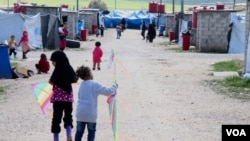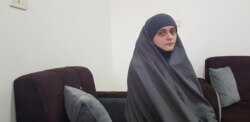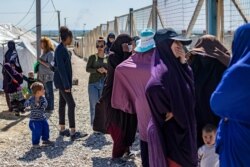Amid increased insecurity and coronavirus cases in northeastern Syria's camps housing foreign Islamic State group families, relatives of IS Bosnian women and children say they are growing frustrated over the slow repatriation process to Bosnia and Herzegovina.
Alema Dolamic, who lives in Tesanj, has spent four years trying to persuade Bosnian officials to repatriate her sister Adela and her three children from al-Roj refugee camp. She says the chances of their reunion are dwindling as authorities seem to drag their feet on the case.
"I have a feeling that she has lost hope that she will ever return," Dolamic said of Adela, who traveled to Syria with her husband and her 8-year-old daughter in 2014.
While in Syria, Adela gave birth to two children, in 2015 and 2016, before her husband was killed fighting for IS. She fled the IS territory in 2017 with her three children and was eventually detained by the U.S.-backed Syrian Democratic Forces (SDF).
For the past four years, Dolamic has communicated with Adela, with permission from SDF authorities, through a voice messaging app. She said the poor living conditions at the camp have been traumatic for her sister and the three children.
"[Adela] has been there for four years. She always seemed to be holding on well. However, lately, she has collapsed completely, and she no longer asks if there is anything new," Dolamic told VOA.
According to the international organization Save the Children, at least 46 COVID-19 cases were reported across the camps in northern Syria in April 2021. It said most of the newly reported cases were among mothers.
"These new figures are incredibly concerning. If this upsurge continues, it will only be a matter of time before hospitals and isolation facilities, which already have very limited capacity, are overwhelmed," said Sonia Khush, Save the Children Syria response director.
Among nearly 63,500 IS families staying in two camps in northeastern Syria under the control of the Kurdish-led SDF, Human Rights Watch estimates 12,000 of them are foreign women and children.
The United Nations has warned against the deteriorating security and humanitarian situation at the camps and asked 57 countries to take back their citizens.
No recent official data are available on the numbers of Bosnians remaining in Syria's camps. The country's officials in late 2019 estimated their number to be 260: 100 men and 160 women and children.
Contacted by VOA, a source from the SDF said that they do not reveal the numbers and nationalities of those in their custody, except when there is a repatriation.
The SDF has said that it holds more than 60,000 people, mostly families of IS fighters or sympathizers of the terror group, in several detention camps in northeast Syria. Most of them were captured following the 2019 U.S.-led campaign that destroyed IS’ so-called caliphate in eastern Syria.
In addition to women and children, the SDF holds more than 10,000 IS fighters, including about 2,000 foreign nationals. SDF officials have called on countries to take back their detained citizens, warning that it does not have enough resources to keep IS prisoners and their families indefinitely, especially amid a rapid spread of the coronavirus in the region. While most governments have not responded to these calls, several countries, including the United States, France, Germany, Britain, Finland and others in central Asia, have repatriated some of their citizens.
Slow repatriation
Unlike countries that refuse to repatriate their citizens because of security and legal concerns, Bosnia and Herzegovina officials have said they would accept their citizens and try the men at home.
In December 2019, a group of 25 Bosnian citizens — seven former IS fighters, six women and 12 children — were returned from Syria on a U.S. Air Force flight. The men were arrested and prosecuted on arrival while the women and children were taken for health examinations.
The repatriation process has since paused, infuriating the relatives of IS families.
The SDF told VOA that the long pause was not on their end and that it was up to Bosnian authorities to take their remaining nationals.
Contacted via email, Bosnia and Herzegovina's Security Ministry told VOA that it was working to organize the return.
A spokesperson from the ministry said in an email that the coronavirus pandemic further exacerbated what was already a lengthy and complicated repatriation process.
Adrian Shtuni, a Washington-based security and radicalization expert, acknowledged that the process was complicated but not impossible given that some other Balkan countries, namely Albania, have continued the repatriation with considerable success.
"The more the process of repatriation is postponed, the harder it will be to handle these returnees and to work with them, and to provide assistance going forward," Shtuni told VOA, adding that among the Balkan countries, Bosnia has the highest number of citizens remaining in Syrian camps.
Deradicalization
Bosnia and Herzegovina convicted 28 people as of December 2020 for their involvement in the war in Syria and other connected felonies, according to the Balkan Investigative Reporting Network's Terrorism Database.
Their sentences were generally short, with almost half the convicts sentenced to one year in prison.
In September 2019, the country started a reintegration program for former foreign fighters and their families. Despite the program, the European Commission's Bosnia and Herzegovina 2020 Report said that very limited assistance for deradicalization was available in prison or upon release.
"Lenient sentences combined with the absence of a probation service and systematic disengagement assistance may still represent a security risk," the report added.
None of the women who were taken back from Syria in December 2019 were tried in Bosnian courts for joining IS.
During an October 2019 interview with the Balkan Investigative Reporting Network, then-Minister of Labor, Social Policy, Displaced Persons and Refugees of the Sarajevo Canton, Malik Garibija, said the government was implementing a social program of rehabilitation and de-traumatization "to help them integrate as much as possible into the local community."
Sead Turcalo, an expert in terrorism and professor at the Faculty of Political Sciences at the University of Sarajevo, said some rehabilitation programs in Bosnia and Herzegovina prisons never entered their application phase.
"What has been done, what I know, has been several research, external analyses and assessments for the need to develop these programs, but they have not yet been fully implemented," he told VOA.
Some experts are concerned that former IS members and their families could remain radicalized and impose a threat on their return. They say children who were raised in the Syrian camps are victims of the conflict and remain particularly vulnerable to extremist ideas.
For Alema Dolamic, the suffering that her nephew and two nieces have gone through in al-Roj camp is heartbreaking.
"They don't even know what home is," she said.
"It is not OK that this is what they get in return, she said. That there is no help in returning them to Bosnia and Herzegovina so they could live a normal life, go to school, not miss anything, and have a childhood they are supposed to be having."
VOA's Sirwan Kajjo contributed to this story from Washington.


